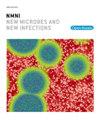COVID-19对年轻人心肺的影响:一项倾向评分加权队列研究
IF 5.4
Q2 INFECTIOUS DISEASES
引用次数: 0
摘要
2019冠状病毒病大流行引发了人们对年轻人持续心肺影响的担忧。本研究旨在评估COVID-19对该人群心肺功能的影响。方法本研究使用来自LoCoMo研究的数据,对瑞士武装部队18-30岁的年轻新兵进行了评估。参与者根据其SARS-CoV-2感染状态进行分类,并进行心肺运动测试(CPET)、肺活量测定法和扩散能力测试(DLCO)。经混杂因素调整后的倾向评分加权比较了对照组和COVID-19组之间的关键结果。我们评估了242名对照组和240名COVID-19组的参与者。倾向评分加权分析显示,大多数CPET和肺部预后无显著差异。COVID-19组在运动高峰时收缩压(SBP)显著降低7.68 mmHg (p = 0.001),在最近的病例(>;6个月,14.60 mmHg, p = 0.002)中更为明显,在非最近的病例(>;6个月,9.07 mmHg, p = <0.001)感染后持续存在。在COVID-19组中,V'Epeak[%预测MVV]增加了2.92%,特别是在感染超过6个月的“非近期”亚组中(p = 0.003)。年轻人在2019冠状病毒病后可能会表现出持续的心肺影响,包括运动高峰时收缩压降低和通气反应增加,这可能是由于调节能力下降和肌肉无力。这些发现强调了在恢复期间保持身体活动以减轻这些影响的重要性。本文章由计算机程序翻译,如有差异,请以英文原文为准。
Cardiorespiratory impact of COVID-19 in young adults: A propensity score-weighted cohort study
Background
The COVID-19 pandemic has raised concerns regarding persisting cardiorespiratory effects in young adults. This study aimed to assess the impact of COVID-19 on cardiopulmonary function in this population.
Methods
This investigation, using data from the LoCoMo study, evaluated young recruits from the Swiss Armed Forces, aged 18–30 years. Participants were categorized based on their SARS-CoV-2 infection status and underwent cardiopulmonary exercise testing (CPET), spirometry, and diffusion capacity tests (DLCO). Propensity score weighting adjusted for confounding factors compared key outcomes between the control and COVID-19 groups.
Finding
We evaluated 242 participants in the control group and 240 in the COVID-19 group. The propensity score-weighted analysis showed no significant differences in most CPET and pulmonary outcomes. The COVID-19 group exhibited a significant reduction in systolic blood pressure (SBP) at peak exercise by 7.68 mmHg (p = 0.001), more pronounced in recent cases (<6 months, 14.60 mmHg, p = 0.002) and persisting after infection in non-recent cases (>6 months, 9.07 mmHg, p = <0.001). There was an increase in V'Epeak [% predicted MVV] by 2.92 % in the COVID-19 group, notably in the “non-recent” subgroup who had been infected more than 6 months previously (p = 0.003).
Interpretation
Young adults can exhibit persisting cardiopulmonary effects post-COVID-19, including reduced systolic blood pressure at peak exercise and increased ventilatory response, likely due to deconditioning and muscle weakness. These findings underscore the importance of maintaining physical activity during recovery to mitigate these effects.
求助全文
通过发布文献求助,成功后即可免费获取论文全文。
去求助
来源期刊

New Microbes and New Infections
Medicine-Infectious Diseases
CiteScore
10.00
自引率
2.50%
发文量
91
审稿时长
114 days
 求助内容:
求助内容: 应助结果提醒方式:
应助结果提醒方式:


